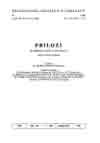Visoko u sastavu Osmanskog Carstva - XV i XVI stoljeće
Visoko within the Ottoman Empire - 15th and 16th Century
Author(s): Hatidža Čar-DrndaSubject(s): History
Published by: Orijentalni Institut u Sarajevu
Summary/Abstract: Visoko appears in historical sources from 1355 as a town of medieval Bosnia, soon to exist as a main marketplace for exchange of precious metals from its neighbourhood. It had the importance of an administrative center. It was a permanent and a periodical residence of the Bosnian rulers. Visoko was a part of the Ottoman Empire before the final fall of the medieval Bosnian state. The administrative and territorial region - nahiya of Visoko - had already been established in 1462, and Visoko was its center. The governor of Bosnia, Ay&s pasha had the historical role in forming this settlement as a town of oriental-islamic type. He had a block of buildings built as his bequest. These buildings were the nucleus of the new town. He had built shops, a public bathhouse, a bridge and a monastery (zaviya). This zaviya was the first moslem religious object in Visoko. It was managed by derwishes. They were more effective than the other people of religion by their ascetic way of living, and somehow poetic manifestation of their ortodox faith of Islam. This zaviya was meritorious for the sudden increase of the Moslem population in Visoko and its surroundings. In the new historical circumstances Visoko grew in accordance to the paradigm of the development of an oriental-islamic city. Untill the third decade of the 16th century Visoko grew up into a settlement with eleven mahallas. In the business part which was separated from the residential part of the city there were various business buildings, which were built in accordance with the rules of Islamic architecture, and also sacred buildings, a public bathhouse (hammam), a public kitchen (imaret) and other needed places were the working population could have a rest. Beside these buildings, there were two mosques and two masjeds, and also an elementary school where Moslem children !earned basic of religion, reading and writing and good behaviour. All these buildings were built by individual financiers as bequest. These well off people, induced by Islamic ideology, accepted the responsibility for advancement of the society. By forming their bequest they also assuered resources for its permanent maintenance.
Journal: Prilozi za orijentalnu filologiju
- Issue Year: 1991
- Issue No: 40
- Page Range: 193-217
- Page Count: 25
- Language: Bosnian

